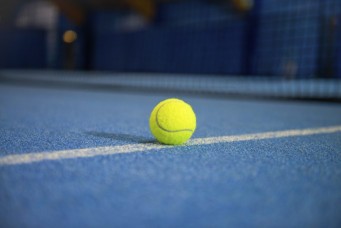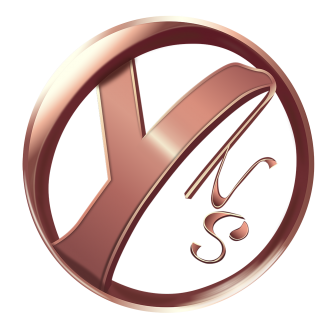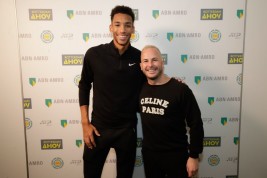
Yannick explains his connection to tennis
L'Équipe, June 7, 2020 (Translated by Google)
Yannick Nézet-Séguin: "Nadal is very Beethoven"
The greatest Canadian conductor is a tennis freak. He cannot help but look at him with a musical eye, which allows him to draw certain parallels between the two passions of his life.
JULIEN REBOULLET
He has been running the OM for twenty years, of which he was named chief for life in September. OM for Orchester Métropolitain de Montréal. At 45, the Quebecer Yannick Nézet-Séguin is so in demand that he also holds the positions of musical director of the prestigious Metropolitan Opera of New York (MET) and the very famous orchestra of Philadelphia. If there was an ATP ranking of conductors, he would camp solidly in the current top 10. Tennis arrived in his life much later than the notes, but it instantly became a refuge. "It's the only thing that excites me, apart from music," explains this dynamic quadra with enthusiasm and simplicity, who prefers sneakers to waxed shoes and likes to build bridges between the various stringed instruments of his life.
WHEN YOU'RE A SO HIGH LEVEL CONDUCTOR, DO YOU REALLY HAVE TIME TO GET INTERESTED IN SPORT?
For fifteen years, following tennis has allowed me to balance myself as a musician. Because it’s true that it never stops; we listen to music all the time, we eat it, we drink it, we sleep with it. It’s a total devotion to an art and a desire for precision. This perfectionism, we can call it what we want, we can put it in the spectrum of autism or see it as an obsessive compulsive disorder, but I prefer to qualify it with the master key which means everything: passion, an essential condition for making all the sacrifices necessary. I only had music in my life and tennis became a valve, an essential counterpoint.
HOW DID IT ENTER YOUR LIFE?
By chance, in 2005. I started my international career and I traveled all over Europe. I was with my parents and, to please my father who loves all sports, I bought tickets for the Monte-Carlo final. I saw Nadal win his first big title (6-3, 6-1, 0-6, 7-5 against Guillermo Coria). I fell in love with the game and the player at the same time.
ARE YOU MORE NADAL THAN FEDERER?
I see that, very often, my musician friends adore Federer, his elegance, his fluidity, his refinement. I understand, because it represents this ideal of transcended work, when everything becomes so natural that it gives the impression that it is always easy. This is a very musical value: relaxation, the absence of harmful tensions for the beautiful sound. But what I like most about music is passion, and that's why I tend to relate to Nadal.
WHAT'S MORE ABOUT YOU?
His way of fighting for absolutely every point resonates with my consideration that absolutely every note is important. When we listen to a piece of music, what comes to us is not just that everything is beautiful and pretty, these are the great moments of emotion, those where passions are unleashed, before giving way to a lull. In the end, you have to have traced something with ups and downs that, taken together, tell a story. It all looks like Nadal and his famous art of winning a match. Almost sickly, or certainly subconsciously, he often put himself in the position of losing before eventually winning, especially at the start of his career. As a musician, I find it very inspiring, this story of the human being who controls his destiny. Nadal is very Beethoven, actually.
DID YOU KNOW THAT HER PATERNAL GRANDFATHER WAS A CONDUCTOR?
Yes, because we talked about it the few times we met. What impressed her most was the length of the plays and operas. He asked me how it was possible to have a symphony lasting more than an hour, or a four-hour opera. It made me smile because, in the end, it’s pretty much like him in a five-set match.
DO YOU SEE MANY COMMON POINTS BETWEEN TENNIS AND CLASSICAL MUSIC?
Yes, starting with this very strong relationship with tradition, this paradox of having to become more modern while staying within the rules of the art.
** SOME ADVOCATE A SHORTENING OF TENNIS FORMATS, ARGUING THAT THE FIRST GAMES OF A SET LACK SALT. DO YOU VALIDATE? **
Of course not. Even if we sometimes have the impression of being against the current because of this length, in tennis as in classical music, I am convinced that as human beings, we need these times, as opposed to all the information that comes to us from everywhere, in a very fragmented way. There’s a lot of talk about attention deficit disorder in people, but it’s not by giving in that we’ll fix it, it’s by keeping moments where we can breathe and get caught up in time.
** QUIT TO LIVE LESS INTENSE MOMENTS THAN OTHER? **
A tennis match is like an opera. You can't give 200% every second; there is a certain calculation, an introduction, a history, an end. It's organic. In any symphony, there is a scenario without which the action that follows would mean nothing. In tennis, the tie-break will not be as hot if nothing has happened before.
** BUT WHEN NICOLAS MAHUT AND JOHN ISNER PLAY FOR ELEVEN HOURS AND FIVE MINUTES IN WIMBLEDON IN 2010, WHEN IS IT TOO LONG?
(laughs) I remember seeing tunes from this match on at least five different TVs. There is hardly anything but Wagner's tetralogy (the Ring of Nibelung, commonly known as the Ring) which lasts a little longer than that (between 1 and 3 p.m.), but it is rarely played in one go. At the MET, I have conducted Parsifal, by the same Wagner, an opera of almost five hours. It’s very physical but it’s mostly a big mental battle. Like on the court.
** SOMETIMES ONE SHOT WILL WORK LESS BETTER THAN ANOTHER, BUT YOU MUST TRY TO WIN WHEN SAME. ARE YOU EXPERIENCING THIS KIND OF SITUATION? **
You perceive the conductor as someone who knows and who dictates to everyone. But it’s also a lot about reacting to musicians. I'm like a trainer, somewhere. If I have a flutist who plays a solo a little lower or if I have a singer who decided that today, it should go faster because his breath is shorter, I have to do with it, associate. It is important not to live in frustration that these are not optimal conditions. Adaptation is as essential as tennis. It is clear that the biggest players manage more often than others to find in them the resources, the solutions.
** WITH THE SAME ULTIMATE PERFECTION QUEST AT HOME AS AT HOME? **
Félix (Auger-Aliassime), who plays the piano and whom I know well (see elsewhere), called me recently saying: “When I hear you, I have the impression that it's always perfect but , in tennis, one has the feeling that it never is; what is the margin of error in music compared to the blows we miss? " I replied that every time I go out to a concert there are a million things I wish I had done differently. In tennis, there is just one ball and two players, but billions of possibilities that come from the exchange. Just like in music, where there are only a few notes and a few chords but just as many possibilities.
** BUT DOES IT EXIST OR NOT, THEN THIS FICTION PERFECTION? **
Trying to be perfect knowing that you can't be perfect: it may sound masochistic but that's what helps us start over immediately, repeat, re-study. In sport as in music at a higher level, that’s why we get up every morning.
** WE DON'T PLAY THE SAME TENNIS AT ROLAND-GARROS OR FLUSHING MEADOWS. IS IT THE SAME FOR AN ORCHESTRA? **
The place influences a lot, yes. You can find dry or reverberated acoustics, which can be similar to a change of surface in tennis. We know in which room we will have to play rounder, or more slowly. And the audience is not the same everywhere, either. In Germanic countries, the concentration is absolute, the reception colder. With great respect but less "fire", a Wimbledon side. In the United States, it's like the US Open. If they like, in the end, they cry out to mute us.
** WHEN YOU WATCH TENNIS, DO YOU HEAR MUSIC? **
When a match starts with a storm, I think of Otello, by Verdi, an opera house where the strongest moment, a storm, is almost at the beginning. I also tend to observe the relationship between intensity and precision, between calculation and emotivity; how you balance your head and your heart, a concept just as essential for musicians.
** AND WHEN YOU'RE AT HOME AND PUTTING ON THE PIANO, THINKING OF TENNIS? **
At home, I have three cats. Two take their operatic names, Mélisande (Pelléas et Mélisande by Debussy) and Rodolfo (La Bohème by Puccini). The third is called Rafa and, unlike the other two, he doesn’t “sing” at all. He prefers to play ball. "


